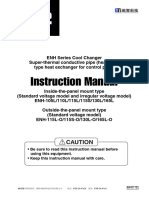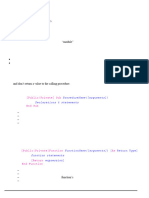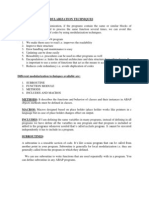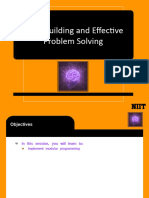0 ratings0% found this document useful (0 votes)
14 viewsModular Programming
Modular programming is the practice of dividing a large program into smaller, manageable sections called modules, which can be developed independently. It offers advantages such as easier debugging and reduced code repetition, but can also lead to issues with variable naming and module linking. Key concepts include main modules, sub-modules, parameters, global and local variables, and methods of argument passing.
Uploaded by
rauniyarchanda01Copyright
© © All Rights Reserved
We take content rights seriously. If you suspect this is your content, claim it here.
Available Formats
Download as PDF, TXT or read online on Scribd
0 ratings0% found this document useful (0 votes)
14 viewsModular Programming
Modular programming is the practice of dividing a large program into smaller, manageable sections called modules, which can be developed independently. It offers advantages such as easier debugging and reduced code repetition, but can also lead to issues with variable naming and module linking. Key concepts include main modules, sub-modules, parameters, global and local variables, and methods of argument passing.
Uploaded by
rauniyarchanda01Copyright
© © All Rights Reserved
We take content rights seriously. If you suspect this is your content, claim it here.
Available Formats
Download as PDF, TXT or read online on Scribd
You are on page 1/ 2
MODULAR PROGRAMMING
1) What is modular programming?
Ans: The process of breaking a large program into small manageable task and designed them independently is
called modular programming. Modular programming helps the programmer for coding in easy way.
2) What is main module?
Ans: It the upper level part of modular programming which controls the entire sub program. Mainly it is a
data entry section for sub programs.
3) What is Sub module/procedure?
Ans: It is a small program written under main module, which process the data and returns the output. There
may be one or more sub modules under a main module. There are two types of sub programs through:
i. SUB …END SUB
ii. FUNCTION…..END FUNCTION
4) Advantages of modular programming:
It is easy and efficient to handle large project
Debugging is easier.
It reduces the task of repeated coding, since same module can be used in different places.
5) Write down the disadvantages of modular programming.
Can lead problems with variable names.
Can lead to problem when modules are linked because link must thoroughly test.
6) What is Argument?
Ans: It is the list of variables, array name or constant which are actually passed to the procedures at the time of
calling function. It is also called real or actual parameter.
7) What is Parameter?
Ans: It the list of variables or array name which are passed to the procedure formally, while declaring the
function or sub procedure. It may be null. It is of two types;
- Formal Parameter
- Actual Parameter
Formal parameters are variable which are used to specify or declare types of data to be passed to the
procedures either sub or function. A formal parameter is always variable.
Actual or Real Parameter: Actual or Real parameters are arguments which are used to pass real value or data
to the procedure. Actual parameter may be variables or constant values.
Example:
DECLARE SUB SUM (A,B)
M=10
N=20
In this example,
CALL SUM (A,B) M and N are actual parameters or Arguments.
END A,P,B and D are formal Parameters.
SUB SUM (P,D)
S=P+D
PRINT “SUM OF TWO NUMBERS=”;S
END SUB
8) What is Global Variable?
Ans: The variable declared outside the modules is called global variable. It can be accessed from both main
module and sub module in the program. Generally, variable declared inside parameter, with Dim shared and
Common shared is global variables.
9) What is Local Variable?
Ans: The variable which is restricted only inside a particular module is called local variable. By default, the
entire variable is local in modular programming.
10) What is SUB…END SUB statement?
Ans: The SUB….END SUB is a procedural statement which is used to define a sub procedure. It declares sub
name related parameter and program codes. The procedure name in SUB statement should be defined same as
the declaration level.
11) What is CALL statement?
Ans: This statement is used to transfer the control between main module and sub procedure. Without this
statement, a program does not return the output.
12) What is FUNCTION…. END FUNCTION?
Ans: It is a user defined function, which accepts data, processes them and returns a value of specific type.
Function… End Function marks the beginning and ending of Function procedure.
13) What is Common Shared?
Ans: This statement is used to make the variable accessible in both main module and sub module. It makes the
variable global. It is declared in main module.
Syntax : COMMON [ SHARED] VARIABLE
Eg. Common shared n,…
14) What do you understand by calling a function?
Ans: To execute the function by passing argument for specific data value is called invoking or calling a
function. It can be called by the following ways:
Variable method (Expression method), eg. V= sum(a,b)
Print method (statement method) , eg: print sum(a,b)
15) What do you understand by Argument passing by value?
Ans: This is the method of passing the real or direct value to the procedure parameter from the calling section.
The arguments and parameters use different memory address. In this method, the values of parameters are
transferred to the parameters to that any change made in the value of parameter does not change the value of
argument.
Example:
DECLARE SUB ADD(A,B)
CLS
CALL ADD(10, 20)
END
SUB ADD(A,B)
S=A+B
PRINT “SUM OF TWO NUMBERS= ”; S
END SUB
16) What do you understand by Argument passing by reference?
Ans: This is the most common method of passing the address or reference to the variable from main module to
sub module instead of value. In this method, the parameters use the same memory address of the arguments
so that any changes made in the value of param eter will change the value of argument too.
Example:
DECLARE SUB KE(M,V)
CLS
INPUT “ENTER THE MASS”;M
INPUT “ENTER THE VELOCITY”;V
CALL KE(M,V)
END
SUB KE(M,V)
K=(1/2)*M*V^2
PRINT “KINETIC ENERGY=”;K
END SUB
You might also like
- Advanced C++ Interview Questions You'll Most Likely Be AskedFrom EverandAdvanced C++ Interview Questions You'll Most Likely Be AskedNo ratings yet
- 12 Informatics Practices Procedures Functions and Modules Key 1No ratings yet12 Informatics Practices Procedures Functions and Modules Key 13 pages
- Chapter 5 - VB - Net Modular ProgrammingNo ratings yetChapter 5 - VB - Net Modular Programming10 pages
- Interest of Procedural Programming: Solution: IdeaNo ratings yetInterest of Procedural Programming: Solution: Idea7 pages
- DSO17BT Programming Principles Chap 2 2018No ratings yetDSO17BT Programming Principles Chap 2 201829 pages
- Programming 2 (Structured Programming) : Worktext in ITC 106No ratings yetProgramming 2 (Structured Programming) : Worktext in ITC 10624 pages
- 351cs64 Visual Programming Notes Unit 1 Variables:: Variable DeclarationNo ratings yet351cs64 Visual Programming Notes Unit 1 Variables:: Variable Declaration15 pages
- Python Advanced Programming: The Guide to Learn Python Programming. Reference with Exercises and Samples About Dynamical Programming, Multithreading, Multiprocessing, Debugging, Testing and MoreFrom EverandPython Advanced Programming: The Guide to Learn Python Programming. Reference with Exercises and Samples About Dynamical Programming, Multithreading, Multiprocessing, Debugging, Testing and MoreNo ratings yet
- CSC301 - CHAPTER 4-2 - Sub Procedures - FunctionsNo ratings yetCSC301 - CHAPTER 4-2 - Sub Procedures - Functions25 pages
- Notes For Structured Programming, Procedure and Function: ComponentsNo ratings yetNotes For Structured Programming, Procedure and Function: Components5 pages
- 8.1 Procedures and Functions UPDATED (MT-L)No ratings yet8.1 Procedures and Functions UPDATED (MT-L)9 pages
- Chapter 3 - Principles of Programming Languages100% (1)Chapter 3 - Principles of Programming Languages17 pages
- 4190 Ais - Database.model - file.PertemuanFileContent Materi6 DDP v1.0No ratings yet4190 Ais - Database.model - file.PertemuanFileContent Materi6 DDP v1.020 pages
- All chapters of Programming with Microsoft Visual Basic 2012 6th Edition Zak Test Bank are available for quick PDF download100% (9)All chapters of Programming with Microsoft Visual Basic 2012 6th Edition Zak Test Bank are available for quick PDF download45 pages
- Pascal Subprogram: Procedure Function Build in Function (E.g. Sin (X) ) Self-Defined Function (Out of Syllabus)No ratings yetPascal Subprogram: Procedure Function Build in Function (E.g. Sin (X) ) Self-Defined Function (Out of Syllabus)13 pages
- M A 2019 P E Vba, XML, ASP: Icrosoft Ccess Rogramming BY Xample With ANDNo ratings yetM A 2019 P E Vba, XML, ASP: Icrosoft Ccess Rogramming BY Xample With AND1 page
- Hacks To Crush Plc Program Fast & Efficiently Everytime... : Coding, Simulating & Testing Programmable Logic Controller With ExamplesFrom EverandHacks To Crush Plc Program Fast & Efficiently Everytime... : Coding, Simulating & Testing Programmable Logic Controller With Examples5/5 (1)
- Notes Chapter 3.1 Lecture 1.1(Procedures)No ratings yetNotes Chapter 3.1 Lecture 1.1(Procedures)13 pages
- Using Logic of Programs With ConditionsNo ratings yetUsing Logic of Programs With Conditions17 pages
- Baron, G Ungemach - 1981 - European Geothermal Drilling Experience - Problem Areas and Case StudiesNo ratings yetBaron, G Ungemach - 1981 - European Geothermal Drilling Experience - Problem Areas and Case Studies24 pages
- Sensors: A Self-Timed Multipurpose Delay Sensor For Field Programmable Gate Arrays (Fpgas)No ratings yetSensors: A Self-Timed Multipurpose Delay Sensor For Field Programmable Gate Arrays (Fpgas)15 pages
- Kinetis Design Studio Porting Guide: Quick StartNo ratings yetKinetis Design Studio Porting Guide: Quick Start12 pages
- Stabilized Chlorine Bleach in Alkaline Detergent Composition and Method of Making and Using The Same Us20060089285a1No ratings yetStabilized Chlorine Bleach in Alkaline Detergent Composition and Method of Making and Using The Same Us20060089285a121 pages
- Python Bindings For The Open Source Electromagnetic Simulator MeepNo ratings yetPython Bindings For The Open Source Electromagnetic Simulator Meep20 pages
- Some Considerations On Future Developments in Ferroalloy Furnaces100% (1)Some Considerations On Future Developments in Ferroalloy Furnaces6 pages
- Latex Manufacturing Process Flow: Teleflex MedicalNo ratings yetLatex Manufacturing Process Flow: Teleflex Medical4 pages
- Board Buses: System Buses (Also Referred To As "Main," "Local," or "Processor-Memory" Buses)No ratings yetBoard Buses: System Buses (Also Referred To As "Main," "Local," or "Processor-Memory" Buses)8 pages
- Antenna Arrays Thesis-Mohammed - AlbannayNo ratings yetAntenna Arrays Thesis-Mohammed - Albannay124 pages
- Testing For Excessive Cylinder Blowby in 3500 EnginesNo ratings yetTesting For Excessive Cylinder Blowby in 3500 Engines10 pages
- Benton, Ted - The Philosophical Foundations of The Three SociologiesNo ratings yetBenton, Ted - The Philosophical Foundations of The Three Sociologies21 pages
- The 69th William Lowell Putnam Mathematical Competition Saturday, December 6, 2008No ratings yetThe 69th William Lowell Putnam Mathematical Competition Saturday, December 6, 20088 pages
























































































